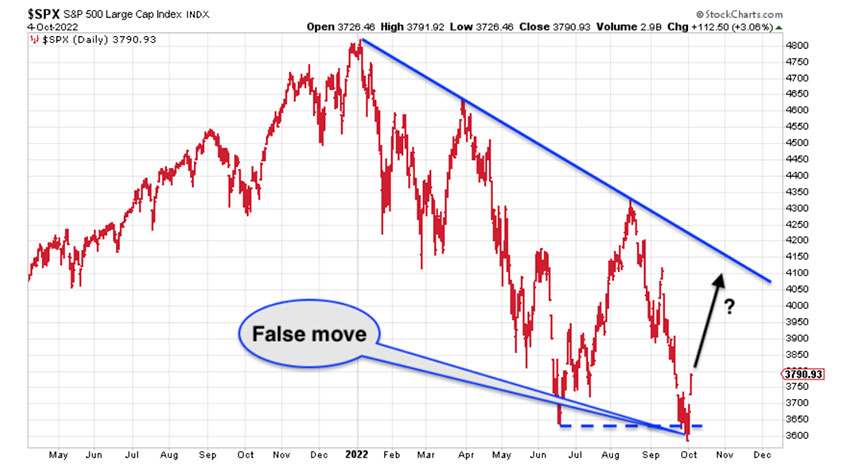Markets may have bounced, but this is not the end of the bear market
Stocks are back on the rise, commodities and precious metals prices are up – even the pound has rebounded. But none of this is typical of bull markets, says Dominic Frisby. The bear market isn’t over yet. Here’s why.


Get the latest financial news, insights and expert analysis from our award-winning MoneyWeek team, to help you understand what really matters when it comes to your finances.
You are now subscribed
Your newsletter sign-up was successful
Want to add more newsletters?

Twice daily
MoneyWeek
Get the latest financial news, insights and expert analysis from our award-winning MoneyWeek team, to help you understand what really matters when it comes to your finances.

Four times a week
Look After My Bills
Sign up to our free money-saving newsletter, filled with the latest news and expert advice to help you find the best tips and deals for managing your bills. Start saving today!
Is that it, then? Is the bear market over?
We’ve seen incredible rallies across the board this week.
After a worrying sell-off late in the day and into the close on Friday, the Dow and S&P500 all both took off on Monday, rallying by over 3%. They then followed through with gains of another 3% on Tuesday.
MoneyWeek
Subscribe to MoneyWeek today and get your first six magazine issues absolutely FREE

Sign up to Money Morning
Don't miss the latest investment and personal finances news, market analysis, plus money-saving tips with our free twice-daily newsletter
Don't miss the latest investment and personal finances news, market analysis, plus money-saving tips with our free twice-daily newsletter
The Nasdaq was up by even more. Given that tech was so totally beaten up, I guess the bigger rally is no surprise.
You could apply the same logic to precious metals. Silver, sold down into the abyss, rose by eight and a half percent on Monday. The call for a multi-week rally in silver is looking good.
Even the once internationally sought-after currency that is sterling has seen a barnstormer.
A week ago everyone was talking about parity with the US dollar. It was all over the headlines (which usually means it’s time to take the other side of the trade). Even Turkey’s President Erdogan, with a display of hypocritical chutzpah that would capture the admiration of even the most duplicitous of tyrants, was deriding it. It has “blown up”, he said. He’s not been looking in the forex mirror lately, it seems.
Sterling went from $1.03 almost to $1.15.
What we’re looking at is a typical short squeeze
I want this bear market over as much as you probably do, and I hate to go all prophet of doom on you, but these kinds of rip roaring rebounds are just that: rebounds. They are not so typical of bull markets.
Let me give you some depressing stats. 1929, 1931, 1932 and 1933 were among the worst years of in US stockmarket history. Famously so. Yet, on a percentage basis, the ten biggest rallies in the Dow Jones Industrial Average In the first half of the 20th century all took place in those years.
Prior to this decade, the best days in the stockmarket since 1950 were, says JC Parets of All Star Charts, in 1987, 2002, 2008 & 2009. Again, not a great time to buy stocks.
These kinds of spikes are not typical of bull markets. That’s not to say they don’t happen in bull markets, but they are more typical of bear markets. Bull markets tend to grind higher. Increased volatility, heightened fear and risk, big up days and big down days, short squeezes: these are all things you see in bear markets.
Indeed, it’s a typical short squeeze. There have been lots of sellers. There are lots of people with big bets that prices will continue falling – a lot of shorts – and suddenly there are no more sellers in this crowded market. As the price turns, the shorts quickly cover their positions – which means there are suddenly lots of buyers – and the market rockets higher. It’s the sudden and rapid covering of positions that causes the spike up.
Of course, sometimes you get these spikes at the final low. March 2009 was one example. March 2020, at the height of the Corona panic, was another. The problem is that on the way to that final low there have been many such up days and down days, so, in real time, you don’t actually know which this is the final one.
“From false moves come fast moves in the opposite direction” is a phrase you may have heard me utter on these pages several times. Friday’s move down was one such example. A break down to new lows, below the June lows, everyone thinks we are going lower. Rumours are flying about. There’s an emergency meeting of the Federal Reserve Bank on Monday. Credit Suisse is going under. The implications of this are bigger than Lehman in 2008.
Then the market turns around and rips everybody’s faces off.
Rip-roaring up-days are are normal for bear markets
As I write now, most markets have turned down again – though at present it looks more like consolidation action after the gains of the last couple of days.
Here’s the S&P500 over the past year. Just look how many rip roaring up-days there have been in 2022, and yet it has been a horrible year for longs.

An obvious magnet for this move is that falling blue trend line just above 4,000. Another potential target would be the 3,850-4,000 area.
I’ve also shown that false move from which this fast move has come: the break below that dashed blue line which marks the June lows.
What do you think? Is the final low or have got more bear market action to come?
Price action tends to set the narrative, and the stockmarket tends to lead the broader economy, so even if you are of the mind that this economic downturn is not over, the stockmarket can still quite easily go higher.
We are going into a good seasonal period for stocks. We have the US mid-term elections in a month, which will give us a better idea of where things are going politically.
I’ll change my opinions as events develop. I always do. We all do. But for now I think the likelihood is that this is a bear market rally.
And, as for silver, I don’t think this is the beginning of the big kahuna to $50. Low- to mid-20s is my target.
Get the latest financial news, insights and expert analysis from our award-winning MoneyWeek team, to help you understand what really matters when it comes to your finances.

-
 How a ‘great view’ from your home can boost its value by 35%
How a ‘great view’ from your home can boost its value by 35%A house that comes with a picturesque backdrop could add tens of thousands of pounds to its asking price – but how does each region compare?
-
 What is a care fees annuity and how much does it cost?
What is a care fees annuity and how much does it cost?How we will be cared for in our later years – and how much we are willing to pay for it – are conversations best had as early as possible. One option to cover the cost is a care fees annuity. We look at the pros and cons.
-
 Halifax: House price slump continues as prices slide for the sixth consecutive month
Halifax: House price slump continues as prices slide for the sixth consecutive monthUK house prices fell again in September as buyers returned, but the slowdown was not as fast as anticipated, latest Halifax data shows. Where are house prices falling the most?
-
 Rents hit a record high - but is the opportunity for buy-to-let investors still strong?
Rents hit a record high - but is the opportunity for buy-to-let investors still strong?UK rent prices have hit a record high with the average hitting over £1,200 a month says Rightmove. Are there still opportunities in buy-to-let?
-
 Pension savers turn to gold investments
Pension savers turn to gold investmentsInvestors are racing to buy gold to protect their pensions from a stock market correction and high inflation, experts say
-
 Where to find the best returns from student accommodation
Where to find the best returns from student accommodationStudent accommodation can be a lucrative investment if you know where to look.
-
 The world’s best bargain stocks
The world’s best bargain stocksSearching for bargain stocks with Alec Cutler of the Orbis Global Balanced Fund, who tells Andrew Van Sickle which sectors are being overlooked.
-
 Revealed: the cheapest cities to own a home in Britain
Revealed: the cheapest cities to own a home in BritainNew research reveals the cheapest cities to own a home, taking account of mortgage payments, utility bills and council tax
-
 UK recession: How to protect your portfolio
UK recession: How to protect your portfolioAs the UK recession is confirmed, we look at ways to protect your wealth.
-
 Buy-to-let returns fall 59% amid higher mortgage rates
Buy-to-let returns fall 59% amid higher mortgage ratesBuy-to-let returns are slumping as the cost of borrowing spirals.